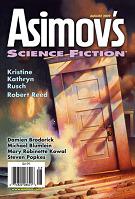 “Turbulence” by Kristine Kathryn Rusch
“Turbulence” by Kristine Kathryn Rusch
“Two Boys” by Stephen Popkes
“The Consciousness Problem” by Mary Robinette Kowal
“Blue” by Derek Zumstead
“Creatures of Well-Defined Habits” by Robert Reed
“The Qualia Engine” by Damien Broderick
“California Burning” by Michael Blumlein.
Reviewed by Steve Davidson
Asimov’s this month offers a series of tales on the subject of fear; where it comes from, what it does to the human condition, and how one deals–or fails to deal–with it.
I read this issue in PDF format and doing so once again confirms my preference for the printed word on paper, between covers.
“The Qualia Engine” by Damien Broderick. They say that it is difficult if not nearly impossible to write a believable story about the supermen that lie in our evolutionary future. Indeed, few have managed it, though the exceptions are well-known and highly regarded works; Odd John by Stapledon, Slan by Van Vogt, More Than Human by Sturgeon. “The Qualia Engine” should probably be added to that list. It’s a modernized cold war tale, a journey of discovery and a familiar tale of love and heartbreak.
“California Burning” by Michael Blumlein. Again, a story that isn’t quite science fiction, and another example of the well-written, engaging, and interesting point of view on things you’d never thought of before. In this tale Blumlein examines what it is to discover that just about everything you thought you knew has little solidity and that one can choose to fear those unknowns, or hold on to the things that really matter. In this study of emotion and uncertainty, a man discovers just how much he doesn’t know about his recently deceased father as he embarks on the strangely difficult quest of cremating the remains.
With “Creatures of Well-Defined Habits” Robert Reed offers light brushstrokes from a very richly detailed post-singularity future and explores the question of exactly how far fear of change can go. A quick and humorous tale concerning the robotic friends of a centuries’ old raconteur and their attempts to pry the conclusion of an oft-told tale from his memory.
“Blue” by Derek Zumstead is a hard SF tale, or at least one that utilizes scientific terms such as quark, event horizon, accretion disks and such, concerning a deep space scientific mission to a black hole that isn’t, a disaster along the way, and the interplay of two astronaut-scientists who have too much time and too much food on their hands. Another tale continuing the apparent theme of this issue–fear, or, in this case, what people do when they try to ignore their fears. The narrative style is a bit choppy and this may put some off.
“The Consciousness Problem” by Mary Robinette Kowal. The skills that have brought Kowal a Campbell award for best new writer are fully on display in this tale of identity and self in which a husband and wife team conducting advanced research into cloning and memory transfer discover the meaning of the phrase ‘absence makes the heart grow fonder’. Serious literary qualities are woven through a well-known science fiction trope (cloning) resulting in a fresh new approach. Kowal has a deftness of touch and descriptive powers not all that common in contemporary SF.
“Two Boys” by Stephen Popkes is another tale that offers a viewpoint on fear, and concerns the reintroduction of Neanderthals into modern society–how they are received and how they receive society. Popkes here creates an ‘other’ in order to look back at ourselves. Along the way he offers a unique take on the Neanderthal’s possible contributions to our own evolution. A decently written tale, though I found the viewpoint a bit confusing in a couple of places.
“Turbulence” by Kristine Kathryn Rusch is an excellent story; well crafted, engaging, and masterfully written. Though the subject (re-engaging with fears we once thought we had mastered) and the locale (an airliner in mid-flight) are familiar, Rusch manages to present them in a fresh manner. My only real quibble with the story is that it isn’t really definable as an SF tale–though the quality is such that it could have easily found a home in the New Yorker and I think readers are better off having read it than not.